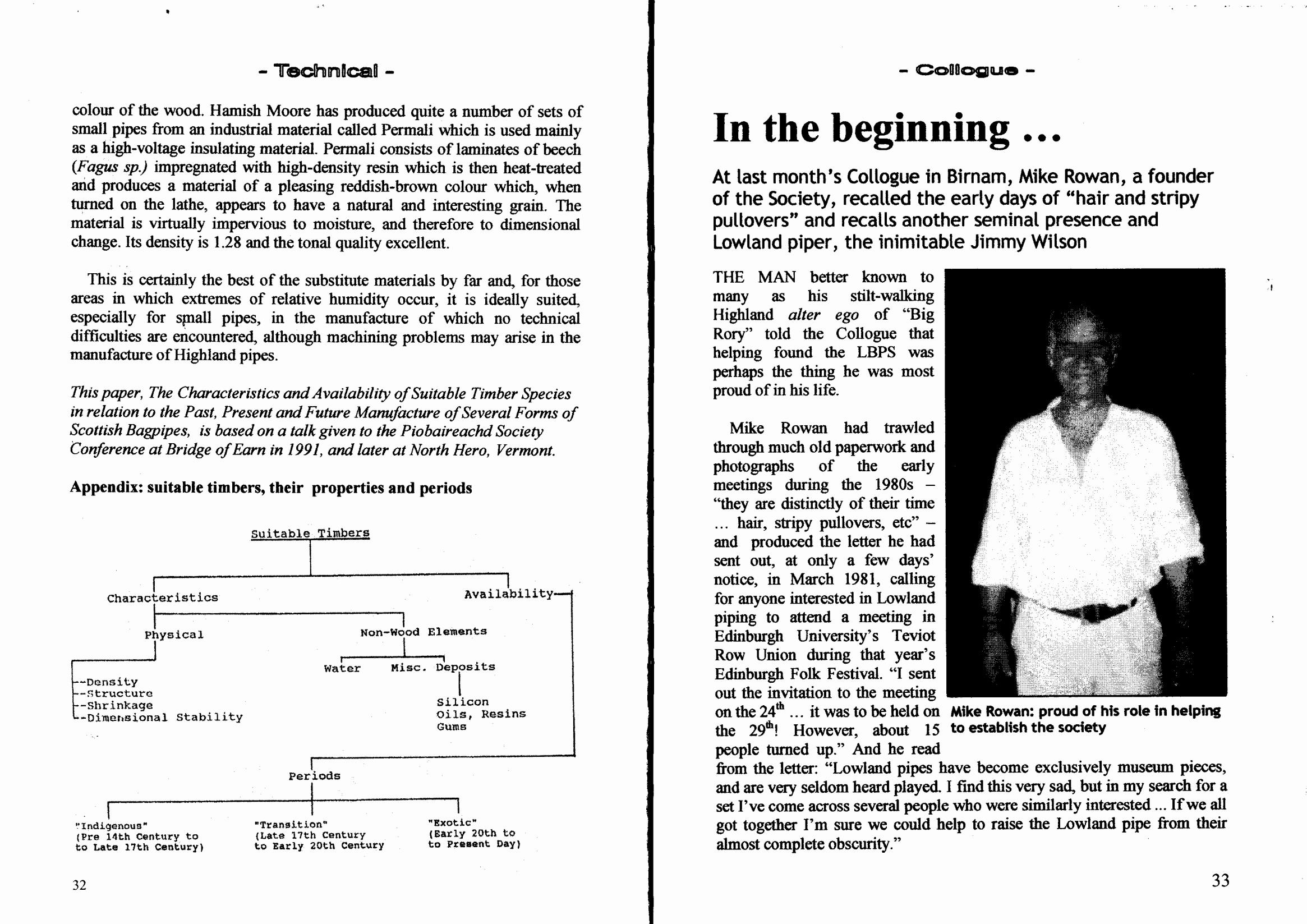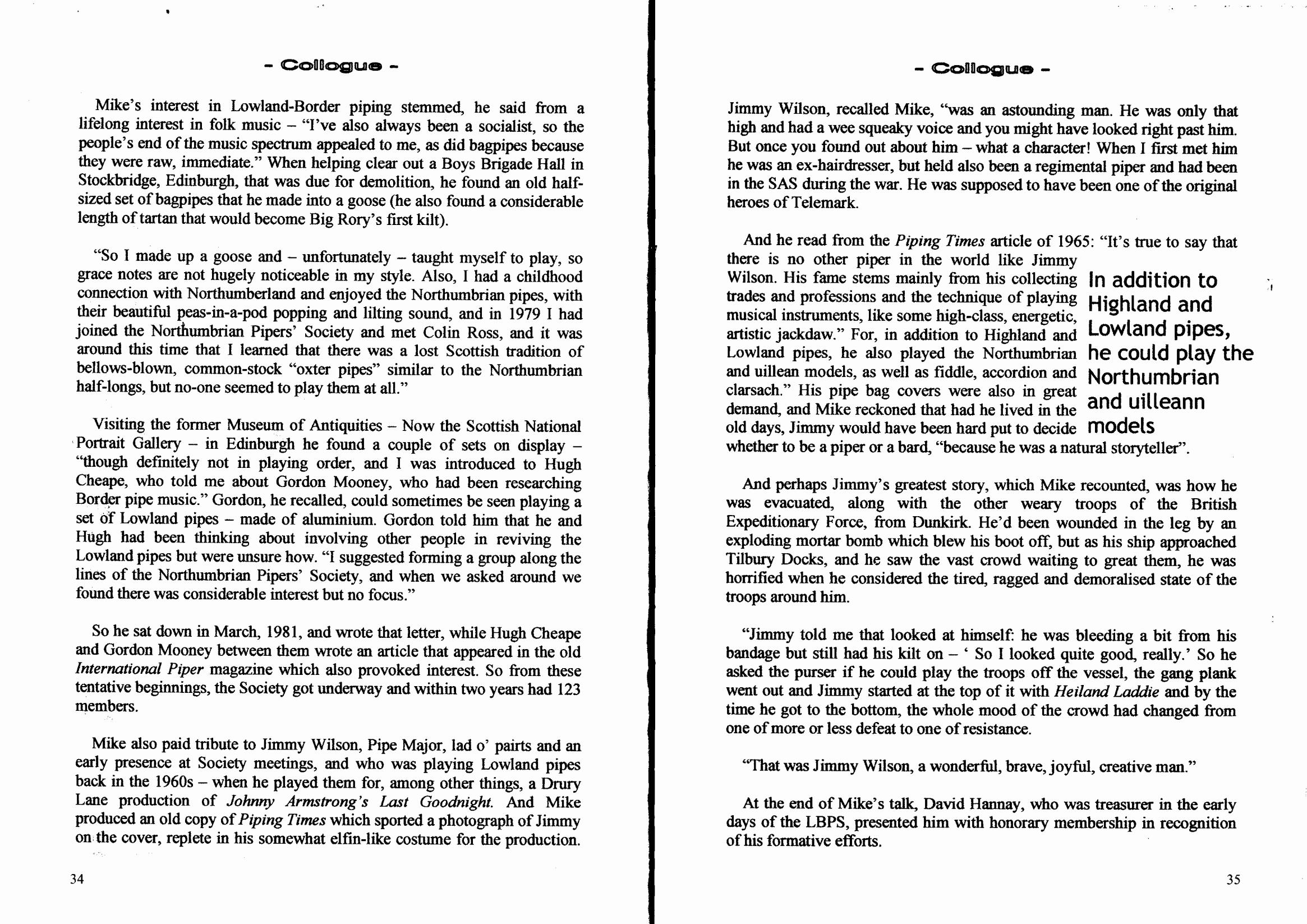In the Beginning - LBPS Founder Mike Rowan


In the beginning ...
At last month's Collogue in Birnam, Mike Rowan, a founder of the Society, recalled the early days of “hair and stripy pullovers” and recalls another seminal presence and Lowland piper, the inimitable Jimmy Wilson.
THE MAN better known to many as his stilt walking Highland alter ego of “Big Rory” told the Collogue helping found the LBPS was perhaps the thing he was most proud of in his life.
Mike Rowan had trawled through much old paperwork and photographs of the early meetings during the 1980s - “they are distinctly of their time ... hair, stripy pullovers, etc” - and produced the letter he had sent out, at only a few days' notice, in March 1981, calling for anyone interested in Lowland piping to attend a meeting in Edinburgh University's Teviot Row Union
during that year's Edinburgh Folk Festival. “I sent out the invitation to the meeting on the 24th ... it was to be held on the 29th! However, about 15 to establish the society people turned up.” And he read from the letter: “Lowland pipes have become exclusively museum pieces, and are very seldom heard played. I find this very sad, but in my search for a set I've come across several people who were similarly interested... If we all got together I'm sure we could help to raise the Lowland pipe from their almost complete obscurity.”
Mike's interest in Lowland-Border piping stemmed, he said from a lifelong interest in folk music - “I've also always been a socialist, so the people's end of the music spectrum appealed to me, as did bagpipes because they were raw, immediate.” When helping clear out a Boys Brigade Hall in Stockbridge, Edinburgh, that was due for demolition, he found an old half-sized set of bagpipes that he made into a goose (he also found a considerable length of tartan that would become Big Rory's first kilt).
“So I made up a goose and - unfortunately - taught myself to play, so grace notes are not hugely noticeable in my style. Also, I had a childhood connection with Northumberland and enjoyed the Northumbrian pipes, with their beautiful peas-in-a-pod popping and lilting sound, and in 1979 I had joined the Northumbrian Pipers' Society and met Colin Ross, and it was around this time that I learned that there was a lost Scottish tradition of bellows- blown, common-stock “oxter pipes” similar to the Northumbrian half-longs, but no-one seemed to play them at all.”
Visiting the former Museum of Antiquities - Now the Scottish National Portrait Gallery - in Edinburgh he found a couple of sets on display - “though definitely not in playing order, and I was introduced to Hugh Cheape, who told me about Gordon Mooney, who had been researching Border pipe music.” Gordon, he recalled, could sometimes be seen playing a set of Lowland pipes - made of aluminium. Gordon told him that he and Hugh had been thinking about involving other people in reviving the Lowland pipes but were unsure how. “I suggested forming a group along the lines of the Northumbrian Pipers' Society, and when we asked around we found there was considerable interest but no focus.”
So he sat down in March, 1981, and wrote that letter, while Hugh Cheape and Gordon Mooney between them wrote an article that appeared in the old International Piper magazine which also provoked interest. So from these tentative beginnings, the Society got underway and within two years had 123 members.
Mike also paid tribute to Jimmy Wilson, Pipe Major, lad o' pairts and an early presence at Society meetings, and who was playing Lowland pipes back in the 1960s - when he played them for, among other things, a Drury Lane production of Johnny Armstrong’s Last Goodnight. And Mike produced an old copy of Piping Times which sported a photograph of Jimmy on the cover, replete in his somewhat elfin-like costume for the production.
Jimmy Wilson, recalled Mike, “was an astounding man. He was only that high and had a wee squeaky voice and you might have looked right past him. But once you found out about him - what a character! When I first met him he was an ex-hairdresser, but held also been a regimental piper and had been in the SAS during the war. He was supposed to have been one of the original heroes of Telemark.
And he read from the Piping Times article of 1965: “It's true to say that there is no other piper in the world like Jimmy Wilson. His fame stems mainly from his collecting trades and professions and the technique of playing musical instruments, like some high-class, energetic, artistic jackdaw.” For, in addition to Highland and Lowland pipes, he also played the Northumbrian and uillean models, as well as fiddle, accordion and clarsach.” His pipe bag covers were also in great demand, and Mike reckoned that had he lived in the old days, Jimmy would have been hard put to decide whether to be a piper or a bard, “because he was a natural storyteller”.
And perhaps Jimmy's greatest story, which Mike recounted, was how he was evacuated, along with the other weary troops of the British Expeditionary Force, from Dunkirk. He'd been wounded in the leg by an exploding mortar bomb which blew his boot off, but as his ship approached Tilbury Docks, and he saw the vast crowd waiting to great them, he was horrified when he considered the tired, ragged and demoralised state of the troops around him.
“Jimmy told me that looked at himself: he was bleeding a bit from his bandage but still had his kilt on - ‘ So I looked quite good, really.' So he asked the purser if he could play the troops off the vessel, the gang plank went out and Jimmy started at the top of it with Heiland Laddie and by the time he got to the bottom, the whole mood of the crowd had
changed from one of more or less defeat to one of resistance.
“That was Jimmy Wilson, a wonderful, brave, joyful, creative man.”
At the end of Mike's talk, David Hannay, who was treasurer in the early days of the LBPS, presented him with honorary membership in recognition of his formative efforts.
